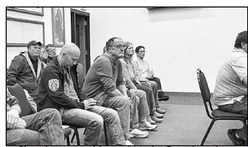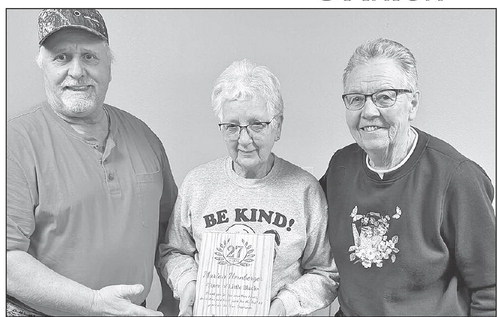Disorder in the court
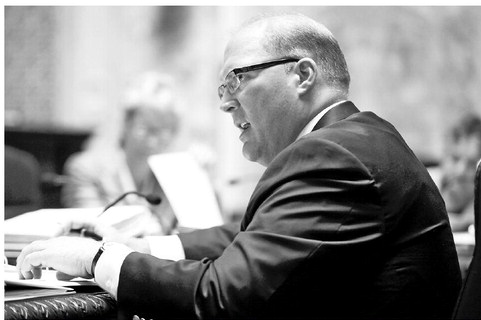

Wisconsin’s Supreme Court has become hyper political. The rise and fall of Michael Gableman’s career shows how that happened.
Wisconsin’s recent Supreme Court election, with its $100 million in record spending and wall-to-wall attack ads, spotlighted how politicized the state’s “nonpartisan” high court has become.
To understand how we got here, consider the rise and fall of former state Supreme Court Justice Michael Gableman, who has agreed to surrender his law license for behavior unbecoming of a lawyer, let alone a former top judge.
Gableman, 58, has agreed to a three-year suspension of his law license for 10 charges of misconduct during his fruitless investigation into 2020 presidential election results in Wisconsin. The total cost to taxpayers of that wasted effort has reached $2.8 million.
The penalty, which Gableman conceded is justified, is the first time the former jurist has faced public consequences, though complaints about his partisan misconduct date to 2008.
Wisconsin Watch has learned that while Gableman was a justice, he attended the 2016 Republican National Convention in Cleveland — in possible violation of judicial rules prohibiting attendance at party conventions. While there he appeared intoxicated and was escorted out of the convention hall after causing disturbances, according to two Wisconsin Republicans in attendance and a third briefed on the incident shortly after it happened.
After that incident, Gableman’s Republican support waned, and he decided, at age 50, not to run for a second 10-year term.
When Assembly Speaker Robin Vos hired Gableman to investigate Donald Trump’s 2020 election loss in Wisconsin, it was not publicly disclosed that Gableman had been given a $170,000 administrative job in Trump’s first administration.
In 2022, a year into Gableman’s investigation, Dane County Circuit Judge Frank Remington asked the Office of Lawyer Regulation in a court order to discipline Gableman. Remington found Gableman in contempt of court and fined him $2,000 per day for refusing Remington’s order to produce documents. Gableman also displayed “sneering” and mocking behavior in court, Remington wrote, and “destroyed any sense of decorum and irreparably damaged the public’s perception of the judicial process.”
‘Always the adult in the room’ Raised in Waukesha County as the youngest of five in a middle-class family, Gableman stood out for doing right, his cousin David Gableman told Wisconsin Watch. The former justice, through his cousin, declined to be interviewed and didn’t respond to other interview requests.
While growing up, “he was always the adult in the room,” David Gableman said. “Always the serious one, very focused. … He always wanted to have an impact, he always wanted to make a difference in life.”
A multiyear class president at New Berlin West High School, Gableman earned a bachelor’s degree in history and education from Ripon College. In earning his law degree in 1993 from the Hamline School of Law in St. Paul, Minnesota, Gableman made the dean’s honor roll.
In 1999 Gableman was appointed by GOP Gov. Tommy Thompson as district attorney in far-northwestern Ashland County. Gableman, who never married and has no children, was aided in his career by Republican Party connections and a willingness to move to rural areas.
Looking back, Thompson doesn’t see it as odd that he didn’t choose a local attorney, though he acknowledged he doesn’t recall even interviewing Gableman. “I’m sure that Michael Gableman’s name came forward as an individual, that he was a Republican and that he was a good lawyer,” Thompson told Wisconsin Watch.
Gableman was elected Ashland County district attorney as a Republican in 2000. District attorneys, unlike judges, can run with a partisan affiliation. By then, Gableman chaired the county Republican Party.
More moves and promotions In 2002, he cut short his term as district attorney to take an administrative law judge position 260 miles away in Appleton under Thompson’s successor, GOP Gov. Scott McCallum. The low-profile, largely bureaucratic position handles disputes within government agencies. But it gave Gableman the title of judge.
Just two months later, McCallum appointed Gableman to a vacant circuit court judgeship 300 miles away in Burnett County, even though Gableman was not an applicant. Gableman contributed $2,500 to McCallum’s campaign in the months before the appointment and headed up some McCallum fundraising events.
Asked why he chose Gableman over two local applicants recommended by the governor’s advisory committee for judicial appointments, McCallum told Wisconsin Watch he knew Gableman “as a supporter of mine” and considered him a good attorney and hard worker.
McCallum made it clear when interviewing then Burnett County district attorney Ken Kutz, a Democrat and one of two finalists, that the selection process was decidedly partisan.
“The first question was, ‘Why the hell should I appoint a Democrat for judge in Burnett County?’” Kutz recalled to Wisconsin Watch.
The other finalist, Republican Polk County District Attorney Mark Biller, said McCallum chose Gableman because McCallum was “looking for someone who could use that job for higher office and advance party goals.”
Nasty ads taint 2008 race Gableman “ran a real tight courtroom” and performed well as a Burnett County judge, Kutz said. Gableman helped create the county’s Drug and Alcohol Court, one of the first in Wisconsin, its Restorative Justice Program that helps divert offenders from jail, and inmate and juvenile justice community service programs.
But when he ran for Supreme Court in 2008 against incumbent Justice Louis Butler, Gableman was virtually unknown outside of GOP circles. His campaign cast Gableman as a law-and-order candidate, drawing a contrast with Butler, who previously worked as a public defender.
Gableman received heavy backing from business interests, especially Wisconsin Manufacturers & Commerce, which wanted a reliable conservative to flip what they viewed as an activist Supreme Court. WMC and other conservative groups spent $2.75 million backing Gableman as he went on to defeat Butler by nearly 3 points, becoming the state’s first candidate to unseat an incumbent justice since 1967.
At the time, the $6 million spent on the race — a fraction of the $100 million spent in the 2025 Supreme Court contest — passed the previous campaign spending record for a Wisconsin Supreme Court seat.
In October 2008, just two months after Gableman was sworn in, the state Judicial Commission filed a complaint against him, alleging one of his campaign ads had violated the state judicial code of conduct. The ad falsely implied that, as a public defender, Butler used a loophole to free an imprisoned rapist.
The Judicial Commission dropped the case in 2010 after the Supreme Court deadlocked 3-3 on what to do about the complaint. Gableman didn’t participate. The other three conservative justices said that while the ad was “distasteful,” its statements were “objectively true” and protected by the First Amendment.
Reliable conservative falls out of favor with his party Gableman’s tenure on the Supreme Court was marked by controversy.
When Justice Ann Walsh Bradley accused Justice David Prosser of putting his hands around her neck during an argument — an incident witnessed by four justices — Gableman’s account was the only outlier, characterizing the 5-foot-3 Walsh Bradley as looming over the 5foot-9 Prosser, according to a sheriff’s report.
Ethics complaints were filed with two state agencies over Gableman’s acceptance of two years of free legal services, likely worth tens of thousands of dollars, in the case filed against him over the Butler ad. As a justice, Gableman did not recuse himself from cases argued by Michael Best & Friedrich, the law firm that provided his free legal aid. No action was taken from those complaints.
Gableman wrote the court’s 5-2 opinion upholding Act 10, the 2011 law that effectively ended collective bargaining for most Wisconsin public employee unions. He also wrote the 4-2 decision that ended what was known as the John Doe II criminal investigation into Republican Gov. Scott Walker’s coordination with outside groups during recall elections that Act 10 triggered.
Gableman’s career took a downward turn after the 2016 Republican National Convention in Cleveland. Attending the convention was by itself problematic for a sitting justice. The state Judicial Code of Conduct directs
See GABLEMAN on page 14
judges to “avoid partisan activity” and says they may not “participate” in political party conventions.
One Republican, speaking on condition of anonymity, said he witnessed Gableman being “loud and obnoxious” at the convention. Gableman appeared to be intoxicated when other attendees escorted him out of the convention hall and back to his hotel, the Republican source said.
That source and another Republican, who was not in attendance, said they were told by party colleagues that Gableman belligerently insulted Janesville U.S. Rep. Paul Ryan, then speaker of the U.S. House of Representatives, in a hospitality suite, before then-U.S. Rep. Sean Duffy whisked him away. Spokespersons for Duffy and Ryan did not return messages seeking comment.
The Republicans who declined to be identified said the incident added to concerns about whether Gableman would be the best candidate to back in 2018. In June 2017, Gableman, then 50, announced he would not run for a second 10-year term. After leaving the court, he disappeared from public view until the 2020 election.
In 2020, Gableman was hired by the federal Office of Personnel Management under Trump. He was involved in implementing a Trump executive order to curb diversity, equity and inclusion (DEI) training for federal employees.
2020 election probe becomes new focus When Trump lost the 2020 election and fought the result with baseless claims of voter fraud, Gableman returned to the spotlight, suggesting the election had been stolen.
In June 2021, Trump accused Vos and other Wisconsin GOP leaders of “working hard to cover up election corruption.” The next day, Vos announced at the state Republican Party convention that he had retained Gableman to investigate the 2020 election.
Asked if he knew, when hiring Gableman, that the former justice had worked for the Trump administration, Vos said he didn’t think so.
The investigation didn’t go well. Gableman acknowledged having little understanding of how elections work. He tried to jail the mayors of Madison and Green Bay for refusing to submit to depositions, which he had no authority to do. He deleted records in violation of state regulations.
While his actions drew derision from Wisconsin legal authorities and even the party leader who hired him, Gableman’s work did please one fan. In April 2022, Gableman attended a party at Trump’s Mar-a-Lago estate in Florida, where Trump praised him before an audience: “Michael, you’ve been unbelievable,” The Washington Post reported.
Vos fired Gableman two months later, calling him an “embarrassment.”
“He paid no attention to detail, he delegated almost all the work to somebody else and very poor followthrough,” Vos told Wisconsin Watch. “It seemed like Mike Gableman was more concerned about the money he was earning as opposed to finding the truth.”
Gableman’s nearly 14-month probe cost taxpayers $2.77 million, including $1.82 million for outside lawyers. Earlier this month, the state agreed to pay $431,843 in legal fees to American Oversight over destruction of records related to the investigation.
The state Office of Lawyer Regulation’s case against Gableman lists 10 violations of Supreme Court rules of professional conduct for attorneys, including making false statements about a judge, an opposing attorney and two mayors; making false statements to the Office of Lawyer Regulation; disobeying a court order; and violating the state open records law and confidentiality rules.
In an April 7 settlement filing: “Gableman hereby stipulates that he cannot successfully defend against the allegations of misconduct … and agrees that the allegations of the complaint provide an adequate factual basis for a determination of SCR (Supreme Court Rules) violations as alleged in each of the ten counts of the complaint.”
The settlement banning him from practicing law for three years still must be approved by the Wisconsin Supreme Court.
Some research for this article was provided by Audrey Nielsen of the nonprofit Sunlight Research Center, which assists newsrooms with investigative reporting.
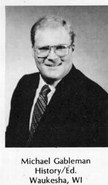
Ripon senior yearbook photo, 1988. (Courtesy of the Ripon Crimson)
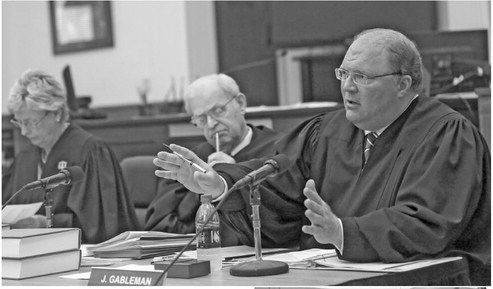
Wisconsin Supreme Court Justice Michael Gableman speaks during a court hearing Sept. 17, 2015, at the Grant County Courthouse in Lancaster, Wis. Also pictured are Justices David Prosser and Ann Walsh Bradley. (Jessica Reilly / Telegraph Herald)
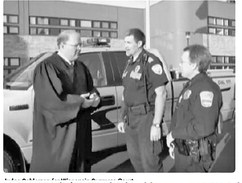
Screen grab from Michael Gableman’s promotional video for his Supreme Court run. (From YouTube channel @gableman1). Link: https://www.youtube. com/watch?v=YL79O-h1VjM



